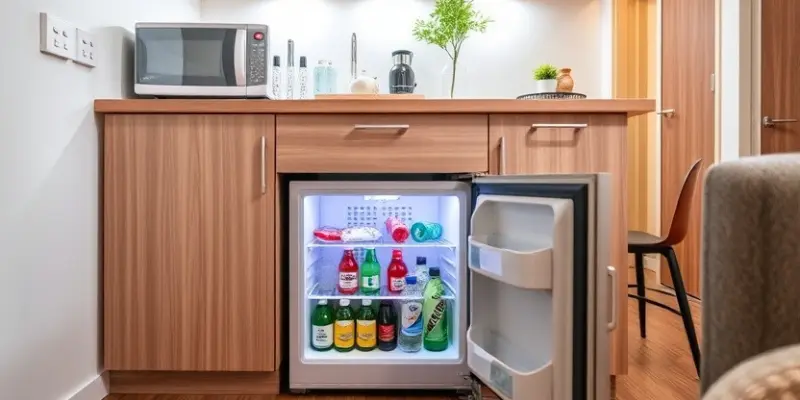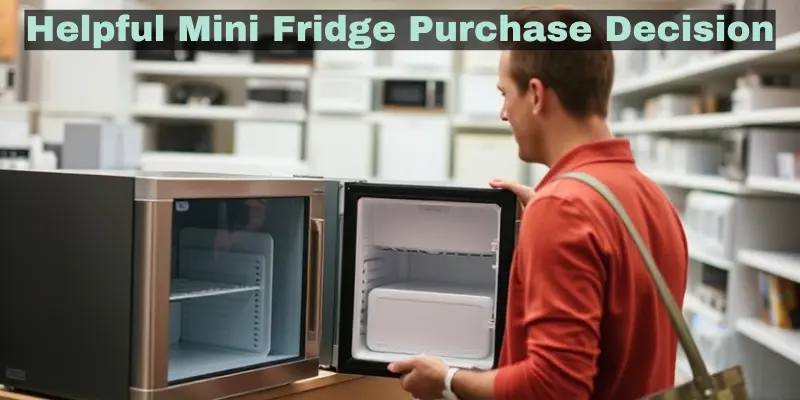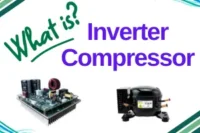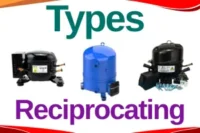Mini Refrigerators: Pros, Cons, and What You Need to Know
Published: 12 Jan 2025
Last summer, Asma moved into a small studio apartment. With limited space in her kitchen, she couldn’t fit a regular refrigerator. So, she bought a mini refrigerator to keep her drinks cool and her snacks fresh. At first, it felt like the perfect solution—it saved space and fit neatly under her counter. But over time, she noticed its limited capacity and occasional temperature inconsistency. Like Asma, many people weigh the advantages and disadvantages of mini refrigerators before deciding if they’re the right choice. Let’s explore both sides of the situation.
let’s move on to our article. Are you ready?
Advantages of Mini Refrigerators
Mini refrigerators are a practical choice for those looking to save space while enjoying essential cooling features. Their compact design and affordability make them ideal for various settings. Here are the key benefits of mini refrigerators:

First, let’s look at the list together.
List of 10 Advantages of Mini Refrigerators:
- Compact size fits small spaces
- Budget-friendly compared to larger models
- Portable and easy to move
- Energy-efficient options available
- Great for personal use or specific storage needs
- Ideal for dorms, offices, or bedrooms
- Keeps drinks and snacks conveniently accessible
- Requires minimal maintenance
- A wide variety of designs and models are available
- Can act as a backup or supplementary fridge
Hey guys, let’s discuss each point in detail together. Are you ready?
1. Compact Size Fits Small Spaces
Mini refrigerators are designed to fit in small areas like dorm rooms, offices, or studio apartments. They easily slide under countertops, sit on desks, or tuck away in unused corners without taking up much room. Their compact nature ensures that they don’t crowd small spaces and allows your setup to remain functional and tidy. If you’re short on space, a mini fridge can be a real lifesaver, helping you maximize utility without compromise.
2. Budget-Friendly Compared to Larger Models
One of the standout features of mini refrigerators is their affordability. They cost a fraction of what a standard refrigerator does, making them an attractive option for students, budget-conscious buyers, or first-time renters. Even with their lower price tag, mini-fridges often include handy features like adjustable shelving and small freezer compartments. They deliver functionality without burning a hole in your pocket.
3. Portable and Easy to Move
Unlike full-sized refrigerators, mini fridges are lightweight and easy to transport. Whether you’re rearranging furniture, moving to a new place, or going on a road trip, these fridges can be relocated with little effort. Their portability extends their usefulness—you can even place them temporarily in an outdoor space during parties or events. Their mobility is one of the reasons they’re so popular.
4. Energy-Efficient Options Available
Mini refrigerators consume less energy than larger models, which not only lowers your electricity bill but also benefits the environment. Many modern mini-fridges come with energy-efficiency certifications that guarantee reduced power usage. These energy-efficient designs make mini-fridges ideal for those who are eco-conscious or trying to minimize household expenses.
5. Great for Personal Use or Specific Storage Needs
Whether you need a dedicated space for snacks, skincare products, medications, or beverages, mini refrigerators cater to personal or specialized storage needs. You can have a mini fridge for your room or a specific area in your house, avoiding clutter in your primary fridge. This focused utility ensures convenience and helps you stay organized.
6. Ideal for Dorms, Offices, or Bedrooms
Mini refrigerators are perfect for spaces where a standard fridge doesn’t fit. They are quiet enough to keep in a shared dorm or workspace without disturbing others. For late-night cravings in your bedroom or quick snack breaks during office hours, a mini fridge provides easy access to refreshments without disrupting your workflow or relaxation.

7. Keeps Drinks and Snacks Conveniently Accessible
There’s something satisfying about having cold drinks and fresh snacks right next to you. A mini fridge ensures that your favorite items are just an arm’s length away, whether you’re studying, working, or lounging. This convenience makes a mini refrigerator feel like a luxury you can easily afford.
8. Requires Minimal Maintenance
Caring for a mini refrigerator is simple and doesn’t require much effort. Their smaller size means less surface area to clean, and most mini fridges feature manual or auto-defrost settings for easier upkeep. With fewer components to maintain or replace, they are a hassle-free addition to your home.
9. Wide Variety of Designs and Models Available
From retro-themed designs to modern stainless steel finishes, mini-fridges come in a wide range of styles. Some models even include fun features like built-in USB chargers or small glass doors for displaying beverages. This variety ensures that you can find a mini fridge that aligns with your taste and complements your living space.
10. Can Act as a Backup or Supplementary Fridge
A mini refrigerator is an excellent backup option for times when your main fridge is full. This is particularly useful during holidays or when hosting events. They’re also great as a secondary fridge to store drinks, medications, or other specialized items separately. This added flexibility makes them invaluable for families or shared living spaces.
Now that we’ve explored the pros of mini refrigerators, it’s important to think about their downsides too. In the next part, we’ll discuss the cons of mini refrigerators to give you a clear picture. Knowing both the advantages and drawbacks will help you decide if a mini refrigerator is the right choice for your needs.
Let’s move to the next section.
Disadvantages of Mini Refrigerators
There are some important downsides of mini refrigerators that you need to know. These points will help you see if a mini fridge matches your lifestyle and space. We’ll start with a quick list of the drawbacks and then go into detail so you can make the best decision.
First, let’s take a look at the list we’ve prepared just for you.
List of 10 Disadvantages of Mini Refrigerators:
- Limited storage capacity
- Difficulty storing large items
- May lack advanced features
- Energy inefficiency in older models
- Potential for noise during operation
- Higher energy usage compared to expectations
- Temperature inconsistencies
- Limited durability for some models
- Not suitable for heavy-duty or family use
- May lack separate freezer compartments
Hey guys, now it’s time to discuss each point of damage in detail. So are you ready? Let’s see together.
1. Limited Storage Capacity
Mini refrigerators are designed for small spaces, so they don’t offer much room. You might struggle to store large grocery hauls or bulkier items like pizza boxes. They’re best for drinks, snacks, and a few essentials, not for large family needs. This can be inconvenient if you like to stock up on food or frozen items. For bigger storage needs, a full-sized refrigerator may be a better option.
2. Difficulty Storing Large Items
Due to their compact size, storing large items such as watermelons or party platters can be challenging. The shelves are often smaller and closer together, limiting space flexibility. Even adjusting shelves might not fully solve this problem. You may need to cut down larger items into smaller portions. This can be frustrating when preparing for events or buying groceries in bulk.
3. May Lack Advanced Features
Mini refrigerators often come with basic features and lack advanced options like frost-free technology or digital controls. They may not include adjustable temperature zones, energy-saving modes, or smart connectivity. Without these extras, maintaining ideal settings for different types of food can be tricky. While this isn’t an issue for simple use, it can be a limitation for those expecting modern conveniences.
4. Energy Inefficiency in Older Models
Older mini refrigerator models can consume more electricity than expected. Without energy-efficient certifications, they may lead to higher utility bills over time. Newer models often perform better, but budget-conscious buyers might overlook energy ratings. This can add an extra cost to running a seemingly cost-effective appliance. Always check for energy efficiency when shopping for a mini fridge.
5. Potential for Noise During Operation
Many mini refrigerators are known for emitting noticeable noise during operation. The hum of the motor or the sound of the compressor might disturb sleep or quiet environments. This is particularly problematic in small apartments, dorm rooms, or offices where every sound is amplified. Quieter models are available, but they might come at a higher price. Checking reviews for noise levels is crucial before purchasing.
6. Higher Energy Usage Compared to Expectations
Despite their size, some mini fridges consume a surprising amount of power. The smaller insulation area and constant need for cooling can increase energy usage. Buyers often assume these appliances are cheaper to operate, but energy consumption might tell a different story. If cost-saving is a priority, investing in an energy-efficient mini fridge is worth considering.
7. Temperature Inconsistencies
Mini refrigerators may struggle with keeping a stable temperature. Items near the back may freeze, while items near the door may not stay as cool. This uneven cooling can spoil certain foods or beverages over time. Adjusting the temperature manually may not always resolve this issue. This makes them less reliable for storing perishable goods.

8. Limited Durability for Some Models
Cheaper mini refrigerators might not last as long as their full-sized counterparts. Materials used in these budget-friendly models may not withstand frequent use or heavy storage. Over time, doors may stop sealing properly, or the cooling system might break down. Investing in a trusted brand or higher-quality model can help avoid these issues.
9. Not Suitable for Heavy-Duty or Family Use
Mini refrigerators aren’t built to handle the demands of large households. They lack the capacity and efficiency needed for frequent restocking or heavy use. Families with multiple members will likely find them insufficient for everyday food storage. They are better suited for single users, small offices, or secondary fridges. Choosing the right refrigerator size depends on your specific needs.
10. May Lack Separate Freezer Compartments
Many mini fridges do not include a separate freezer section, or if they do, it’s often very small. This can be an issue if you need to store frozen foods or ice. The combined fridge-freezer setup may also lead to frost buildup, requiring manual defrosting. For those who frequently use a freezer, this limitation can become a major inconvenience.
Hey guys, we’ve talked all about the pros and cons of mini refrigerators, but we know it’s not always easy to make a final choice.
No need to worry! We’ve prepared something special just for you to help you decide. In the next section, we’ll share a clear conclusion. So, are you ready? Let’s jump in!
Conclusion
So guys, in this article, we’ve covered the advantages and disadvantages of mini refrigerators in detail. If you have limited space and only need a compact cooling solution, a mini fridge can be an excellent choice. However, keep in mind the limitations, such as smaller capacity and inconsistent temperatures. My recommendation? Weigh your specific needs carefully before making a purchase. If you think a mini refrigerator fits your lifestyle, go ahead and enjoy the space-saving benefits! Feel free to check out other related articles on our blog to explore more options and helpful tips!

If you still have some questions in your mind about mini refrigerators, don’t worry at all. We’ve gathered the most commonly asked questions and answered them for you. Let’s go through them one by one to clear all your doubts.
FAQs About Mini Refrigerators
If you’re considering buying a mini refrigerator, you might still have a few doubts. From how they work to how long they last, these are some of the most common questions people search for. To make it easier for you, we’ve gathered these questions in one place so you can have all the information at your fingertips. Check out the list below to find the answers you’re looking for!
Questions About Mini Refrigerators:
- How long will my mini-fridge last?
- Can you plug in a mini-fridge anywhere?
- What is the purpose of a mini-fridge?
- What keeps a mini-fridge cold?
- How long do mini fridges take to get cold?
- What happens if you don’t defrost a mini fridge?
- What are the disadvantages of mini refrigerators?
- Can you turn a mini fridge off at night?
- Can mini-fridges be repaired?
- Does a mini fridge save electricity?
- Are a mini fridge and a compact fridge the same thing?
Hey guys, now it’s time to discuss each question in detail. Let’s find out together.
A mini fridge typically lasts between 6 to 10 years. Regular cleaning, defrosting, and keeping it in a stable environment can prolong its life. Avoid overloading or blocking its vents to maintain proper performance.
Yes, as long as there’s a standard power outlet available. Make sure the outlet is not overloaded with other devices. Always place the fridge on a stable surface to ensure safe operation.
Mini fridges are compact and designed for personal use, storing small amounts of food, drinks, or other essentials. They’re perfect for dorm rooms, offices, or bedrooms. You can also use them to keep medications or skincare products cool.
Most mini fridges use compressors or thermoelectric systems to maintain low temperatures. The system absorbs heat from the inside and releases it outside the fridge. Keeping the fridge’s vents clear ensures consistent cooling.
It usually takes 2 to 4 hours for a mini fridge to cool down after you turn it on. Some may take up to 24 hours to reach the desired temperature. Pre-cooling your items can speed up the process.
Ice buildup can block vents and reduce the fridge’s cooling efficiency. This increases energy consumption and may shorten its lifespan. Regular defrosting helps avoid these issues and keeps the fridge working properly.
Mini fridges have limited storage and may not maintain even temperatures in extreme conditions. They can be noisy, depending on the model, and often lack advanced features like frost-free systems. Some may use more energy than expected if they aren’t energy-efficient models.
It’s not recommended to turn a mini fridge off frequently, as it can damage the cooling system. If you do turn it off, remove perishable items and clean the interior. Leaving it off regularly might affect its longevity and efficiency.
Yes, depending on the issue, many mini fridges can be repaired. Simple fixes like replacing door seals or thermostats are manageable, but complex issues like compressor failures might require professional help. Some problems may cost more to repair than buying a new unit.
Mini fridges use less electricity than full-sized refrigerators, especially energy-efficient models. However, older or poorly insulated models might consume more power than expected. Look for Energy Star-rated appliances for better savings.
Yes, both terms refer to small refrigerators designed for limited spaces and have similar features and sizes.
Thank you for reading! If you’re left with any questions about mini refrigerators, don’t hesitate to ask in the comments below—we’re always happy to assist. Be sure to read our in-depth post about related refrigerator types here: Difference Between Compact and Built-in Refrigerators. And don’t miss out on our other helpful articles!





